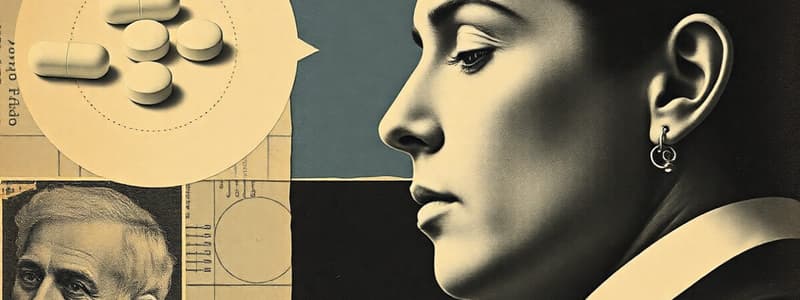Podcast
Questions and Answers
The maximum licensed dose of Lurasidone in its base form is 148 mg/day.
The maximum licensed dose of Lurasidone in its base form is 148 mg/day.
True (A)
Sulpiride has a maximum dose limit of 2400 mg/day.
Sulpiride has a maximum dose limit of 2400 mg/day.
True (A)
Haloperidol has a higher maximum dose for oral administration than for long-acting injections.
Haloperidol has a higher maximum dose for oral administration than for long-acting injections.
False (B)
Cariprazine has a licensed maximum oral dose of 6 mg/day.
Cariprazine has a licensed maximum oral dose of 6 mg/day.
Perphenazine is allowed a maximum dose of 64 mg/day only for non-hospitalized patients.
Perphenazine is allowed a maximum dose of 64 mg/day only for non-hospitalized patients.
The minimum effective dose of Chlorpromazine for a first episode of schizophrenia is 400 mg.
The minimum effective dose of Chlorpromazine for a first episode of schizophrenia is 400 mg.
Iloperidone has a minimum effective dose of 8 mg for multi-episode schizophrenia.
Iloperidone has a minimum effective dose of 8 mg for multi-episode schizophrenia.
The dosage for Aripiprazole is the same for both first episode and multi-episode schizophrenia.
The dosage for Aripiprazole is the same for both first episode and multi-episode schizophrenia.
For Quetiapine, higher doses than the minimum effective doses are frequently used.
For Quetiapine, higher doses than the minimum effective doses are frequently used.
The minimum effective dose of Lumateperone is known for both first and multi-episode schizophrenia.
The minimum effective dose of Lumateperone is known for both first and multi-episode schizophrenia.
The maximum dose of Risperidone (Janssen) inside the EU is 50 mg every 2 weeks.
The maximum dose of Risperidone (Janssen) inside the EU is 50 mg every 2 weeks.
Pipotiazine can be administered at a maximum dose of 200 mg every 3 weeks inside the EU.
Pipotiazine can be administered at a maximum dose of 200 mg every 3 weeks inside the EU.
The maximum oral dose for Lumateperone is 42 mg/day.
The maximum oral dose for Lumateperone is 42 mg/day.
Zuclopenthixol depot can be administered at 600 mg every week in the EU.
Zuclopenthixol depot can be administered at 600 mg every week in the EU.
Blonanserin is available with a maximum dose of 80 mg/day patch and 24 mg/day oral.
Blonanserin is available with a maximum dose of 80 mg/day patch and 24 mg/day oral.
The highest effective dose should be used for each patient to ensure the best response.
The highest effective dose should be used for each patient to ensure the best response.
Long-acting injections maintain plasma levels for at least 6–12 weeks after initiation without dose changes.
Long-acting injections maintain plasma levels for at least 6–12 weeks after initiation without dose changes.
Antipsychotic polypharmacy is generally encouraged for better treatment outcomes.
Antipsychotic polypharmacy is generally encouraged for better treatment outcomes.
Studies indicate that combinations of antipsychotics can be prescribed even if a single antipsychotic has been ineffective.
Studies indicate that combinations of antipsychotics can be prescribed even if a single antipsychotic has been ineffective.
Antipsychotics are recommended to be used as 'when necessary' sedatives.
Antipsychotics are recommended to be used as 'when necessary' sedatives.
Responses to antipsychotic treatment should be documented using unverified scales.
Responses to antipsychotic treatment should be documented using unverified scales.
Close monitoring of physical health is unnecessary for patients on antipsychotics.
Close monitoring of physical health is unnecessary for patients on antipsychotics.
When withdrawing antipsychotics, a hyperbolic regimen should be used.
When withdrawing antipsychotics, a hyperbolic regimen should be used.
Flashcards are hidden until you start studying
Study Notes
Licensed Maximum Doses
- The text mentions the maximum licensed doses of antipsychotics inside and outside the European Union (EU).
- Inside the EU, the maximum doses for some drugs include:
- Paliperidone depot: 525 mg every 3 months
- Risperidone (Janssen): 50 mg every 2 weeks
- Outside the EU, the maximum doses for some drugs include:
- Pimavanserin: 34 mg/day
- Ziprasidone: 160 mg/day
- The maximum doses for various oral and long-acting injection antipsychotics are listed in tables, grouped by drug category (FGAs, SGAs).
Minimum Effective Doses
- Table 1.1 suggests the minimum doses of antipsychotics likely to be effective in first- or multi-episode schizophrenia.
- Most patients will respond to the suggested dose, but some may require higher doses.
- Doses should be considered approximate due to individual response variations.
- The table only covers oral treatment with commonly used drugs.
General Principles of Prescribing
- The lowest possible dose should be used.
- Dose increases should occur only after one or two weeks of assessment in which the patient shows poor or no response.
- Response to antipsychotic treatment should be assessed using rating scales and documented in patient records.
- Patients receiving antipsychotics should undergo close monitoring of their physical health, including blood pressure, pulse, ECG, plasma glucose, and plasma lipids.
- When withdrawing antipsychotics, the dose should be reduced slowly in a hyperbolic regimen to minimize withdrawal symptoms and rebound psychosis.
- Generally, antipsychotic polypharmacy should be avoided due to the increased risk of adverse effects.
- Antipsychotics should not be used as "when necessary" sedatives.
- Combinations of antipsychotics should only be used if a single antipsychotic, including clozapine, proves ineffective.
Studying That Suits You
Use AI to generate personalized quizzes and flashcards to suit your learning preferences.




